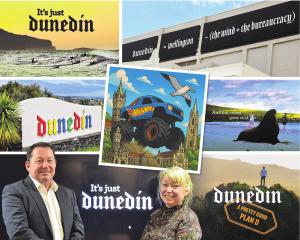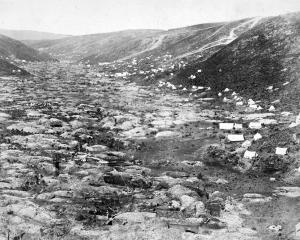
The newsprint in a newspaper might have fulfilled its destiny, yet spare a thought for the stuff that has missed its chance to help make headlines, writes Shawn McAvinue.
If you've bought newsprint rolls from Allied Press, chances are customer services representative Glenda Jenks has sorted your order.
She has been selling waste rolls of Allied Press newsprint for nearly 27 years.
The orders for the rolls come from across Otago and Southland.
The varied buyers ranging from butchers to bakers to cheese and dress makers.
The absorbency of the paper is a selling point for puppy and kitten breeders and nearly every fish and chip shop in Dunedin.
The newsprint missed the cut at becoming an Otago Daily Times, but it gets to realise its potential across the South in many other ways ...

BEAUTY PARLOUR
If you consider being hairy an Achilles heel, then chances are you've rested your feet on newsprint.
Stray hair needs to beware when entering Dunedin business Only Ur's Beauty Parlour in Moray Pl.
If customers are getting an upper lip waxed, or an eyelash tint, the table on which they lie uses Allied Press newsprint (on the footrest).

Parlour owner Jasmeet Madan says he's been buying newsprint from Allied Press for more than two years.
Beauticians cut the newsprint rolls into 1sqm pieces, fold it in half and place it on the bench for customers to rest their feet on.
"It keeps it hygienic - neat and clean.''
After the beauty treatment, the newsprint is thrown away.
The parlour opened in Moray Pl about four years ago. At the time, Mr Madan was unaware newsprint was for sale around the corner.
Instead, he bought pre-cut newsprint from a beauty supplies business in Tauranga until he discovered Allied Press was offering the same product cheaper.
Buying newsprint in Dunedin was a win-win because he preferred buying locally and he could get it immediately.
The busiest days in the parlour are Thursdays, Fridays and Saturdays.
About 10% of the customers are men, who were mostly getting their chests, back and eyebrows waxed.
The parlour uses about six rolls of newsprint each week, he says, adding "Sometimes more when it's busy.''

CAFE
A specials board in a Dunedin cafe is made from unwanted items but displays a list of desired dining options - isn't it ironic?
Ironic Cafe and Bar co-owner Steve Wilson has been buying newsprint from Allied Press since the cafe opened in Anzac Ave about 10 years ago.
He used to buy 40cm rolls but when they became scarce he bought 80cm rolls and sawed them half.
Replete with daily specials featuring seasonal produce (when the Otago Daily Times called, whitebait was making its final appearance for 2016), one such sawn roll hangs from a contraption made by late sculptor Chris Nedder.
The quirky machine comprises recycled materials, including a shifting spanner, cogs and chains from a washing machine, some wood, possibly from a bedside cabinet, and a "really cool'' chrome badge salvaged from a Holden Special car.
If staff want to reveal some blank newsprint to update the specials board, the cogs must churn, creating an industrial "clunk, clunk, clunk'' sound.
"It's a work of art ...'' Mr Wilson says proudly.
After the insurance details have been swapped, newsprint gets to work to help repair some of Dunedin’s damaged fleet.

PANELBEATER
Bridgman Street Panelbeaters is one of many businesses across Otago and Southland buying newsprint to use while painting vehicles.
Managing director Brent Johnston says the Kensington panelbeating business has been buying Allied Press newsprint for more than 30 years, preferring it to plastic because it was more environmentally friendly.
Still, plastic is used for the ‘‘big jobs’’ when a vehicle needed to be completely wrapped. However, for a small job it made sense to use newsprint. It also ‘‘keeps the cost down’’.
Newsprint was also cheaper to dump than plastic.
The company used to be able to recycle the used newsprint until recyclers stopped taking it.
To reduce charges at the transfer station, the used newsprint is pressed into 100kg bales, minimising the space required to transport it via trailer to the tip. Compressed newsprint is also less flammable, posing a smaller fire risk when stored.
Some panelbeaters might consider the use of newsprint to be an antiquated masking method, yet newsprint is ideal because the water-based paints the business uses don’t seep through it.
‘‘The reality is it’s foolproof — it’s not a fly-by-nighter. . . when it’s a wee job it’s ideal — quick and easy.’’

RESTAURANT
As lamb and chicken rotates around a heat lamp, diners use crayons to add colour to newsprint in a central Dunedin restaurant.

Paasha Turkish Cafe manager Charan "Cha Cha'' Stevenson says newsprint was put on tables in the St Andrew St restaurant long before he started working there three years ago.
The primary purpose of the newsprint is to protect the red tablecloths and to make the clean-up easier.
Crayons are available for diners to decorate the newsprint.
The most popular nights for diners requesting crayons are Thursdays, Fridays and Saturdays.
Most of the artists were young children but often students request crayons.
"They draw inappropriate stuff on the table and we chuck them out straight away,'' he laughs.
The diners' doodles have ranged from games of noughts and crosses to detailed portraits of United States president-elect Donald Trump.
Some of the drawings were amusing and more popular sketches are hung in the staff room.
About a year ago, a little girl drew Mr Stevenson a picture of someone dancing. He told her he liked the whimsical drawing so much he would hang it in his locker.
"It has been here ever since.''
NEWSPRINT FACTS
• Allied Press newsprint is made by Norske Skog at a pulp and paper mill just outside the town of Kawerau in the Eastern Bay of Plenty.
• The newsprint reels the Otago Daily Times is printed on weighs 710kg and are 20,000m long and 80cm wide and have a 126.5cm diameter including the core.
• Newsprint also come in 40cm wide rolls but had been hard to get when Allied Press started using the rolls as hand towels in its building in Stuart St.
• The 40cm rolls became more readily available since hand towel dispensers were installed at Allied Press.
• The waste rolls are sold by weight starting at $1.












